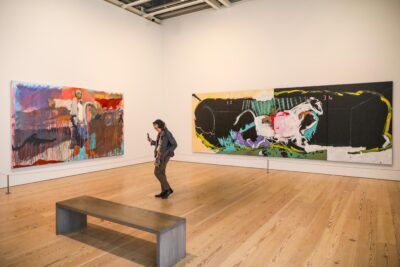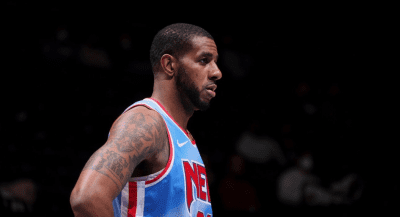Courtesy BRIC Arts Media
Celebrate Brooklyn’s executive producer pulls the curtain back on how the festival gets organized
How veteran music professional Lia Camille Crockett spent her first year running Celebrate Brooklyn!—in a pandemic
Lia Camille Crockett has had a year. As executive producer of BRIC Arts Media’s Celebrate Brooklyn! Festival, Crockett has had to navigate ever-evolving Covid regulations for live events while maintaining the festival’s prestige reputation—all during her first year in the role.
“I came into this role thinking I was flexible and then the pandemic was like, ‘oh you thought you were’,” Crockett says. “I’ve learned so much about how to embrace the chaos. It just made me a better producer.”
But Crockett is far from green, with well over a decade of experience in various aspects of live music. She’s been with BRIC for five years and, prior, produced events for Remezcla, and worked in marketing for Giant Noise PR and the Pachanga Latino Music Festival in addition to producing her own events. A native of Austin, Texas, Crockett has staked a claim in New York and put her passion for music discovery on full display at the Prospect Park Bandshell.
“I think music discovery is one of the most exciting things that we can offer,” she continues. “I don’t only want to be known for having big name artists … I want to be a place where we’re welcoming enough and have a solid enough track record that we can be part of everybody’s summer. No matter what your musical preference might be.”
Crockett spoke with Brooklyn Magazine midway through Celebrate Brooklyn’s festival season. This interview has been edited and condensed for clarity.


Photo: Antoine DeBrill
Coming up in Austin, you worked in PR, sponsorships, live music. How has that path brought you here?
When you’re putting a festival together, you need great artists at the center. And you also need a great publicist, and you need a great production team, and you need some thoughtful sponsorship packages. All of these things have to work together, and that’s how I sort of naturally evolved into being a producer, because the producer is looking at all of those things, and how they all inform each other.
What drew you to BRIC and Celebrate Brooklyn?
It sounds corny to say this, but when I was younger, I had this dream of running my own festival one day, or some big type of festival. I wanted it to be accessible, I wanted it to be for everybody — I remember that being this motivation. Comparing that to my understanding of festivals [at the time] which was, like, very corporate and very expensive.
I remember my first summer moving to New York going to see Femi Kuti [at Celebrate Brooklyn!], by myself, because I didn’t know anyone. And just walking through and feeling so overcome with joy, and just thinking that the vibes were so good. It’s an impeccable show on its own, and then I’m just watching kids running around and teenagers flirting in the corner, and then like a bunch of people raging at the front. It really gave me this big sense of nostalgia. It was one of those cliche moments where you’re like, Oh, man, I’m so glad I moved to New York.
I have had plenty of those moments at Celebrate Brooklyn! myself.
When I look back on career choices that I’ve made, I think without realizing it, I tend to be drawn to projects that are really community focused. I started working at the Austin Chronicle, and that was all about uplifting local Austin politics and culture. And then when I worked at Pachanga fest, it was really about uplifting the Latinx community.
That’s why I was drawn to BRIC, and to Celebrate Brooklyn!, because it’s large scale but very much rooted in—I can’t believe I’m saying this—celebrating Brooklyn by providing a space that’s truly for everybody. We’ve been in the park long enough that people come to the park all the time without knowing who the bands are.
Tell me about your curatorial approach; what are some of the key elements that you look at when setting the line-up for a season?
In one summer of shows, we know we can’t hit every single mark, but every year we want to think through the lens of being able to provide something for everyone in Brooklyn. This festival has been going on for so long and has had a strong curatorial voice, certainly predating me. And so a lot of our conversations about artists can be going on for literal years. There are certain iconic artists, or maybe there’s a musical moment that’s happening, that we really want to make sure and highlight that year and so a couple of those tentpole, gotta have it things, bubble up to the top.
I’m sure that you listen extremely widely and your taste is constantly evolving, but do you have a particular area of interest?
My job as the executive producer with a really talented team is to push and encourage risk-taking. [To] always ask ourselves: Are we getting too comfortable and how can we not repeat something that we did last year? I have a personal passion for uplifting Latinx music and culture. Being Latina, and growing up in the U.S. I see Latinx culture is so broad, and every country has such deep and rich musical variety.
Are there any shows that you are really proud of, where you feel like you were pushing those boundaries?
Bringing Celso Piña to Celebrate Brooklyn. We’ve had amazing artists from Mexico over the years, without a question. But we really never had somebody like [him]. My first year was all about just keeping the ship from sinking in a crazy pandemic. And now, I feel like we’ve done that, and moved mountains to do that, and would not be able to do that without the support of Brooklynites. And I’m looking into 2022, onward: How we can push these boundaries? How can we challenge ourselves curatorially? What are the blind spots? What haven’t we covered in a while?
What do you what do you want to do more of at the festival?
We haven’t done a big salsa show in a few years. It would be my dream to bring back Ruben Blades, because we haven’t had him in a while and he’s a total icon. I also and this is like a personal affinity, I just absolutely love dancehall and soca and we have a lot of that richness already in Brooklyn. That’s part of the Brooklyn soundtrack. And while we’d certainly presented great artists like Tabou Combo, I would love to present more of that.
It’s not about, “let’s check a box and hit every genre every year.” We start every year with a never-ending wish list of things that we want—whether that’s specific artists, or styles or a movement that we want to present. And then we have to go down the process of availability and cost and production and all of those things.
Obviously, this season was incredibly challenging because of Covid. What have you learned from this past year that you can apply to the future?
The biggest thing that I learned was how much you need your people—from a very personal level to a very macro level. I could not have navigated this without so many women to get advice from, whether that was logistical advice on these never-ending changes, or just advice on how to strategize. On the macro level, being part of groups like NYIVA and this outdoor Performing Arts coalition, that was the most that I had ever seen the performing arts community really come together. The pandemic really incited some really intentional organizing, and cooperative ways of working. I’m excited to see that continue, because I would not be here if it weren’t for just the support and the camaraderie and the knowledge sharing amongst all of my colleagues.
The executive team at Celebrate Brooklyn! Is majority-female. Have you ever worked anywhere where there are a majority of women in leadership positions in music?
I’ve been lucky that throughout my career, I have had strong female mentors and colleagues. But they have absolutely been few and far between. To be working on a major music festival with so many women in various positions throughout the festival is extremely rewarding. It reminds me of when I was young, and how much I needed mentors—other female mentors, other Latina mentors—to give me the confidence to continue this work. So it’s just invigorating.
And we think more about the talent pipeline and how music has been, unfortunately, male dominated, even though I don’t even think that’s true. My anecdotal observations are that actually many women have been running various aspects of the music world but we’re in positions that were unrecognized or uncredited. So I’m happy to see more women in positions that are recognized.
Do you have any advice for somebody who wants to be a producer, or work in festivals and nonprofits?
My first thought when I get this question is to go work in the service industry. Shout out to all hospitality workers! I waited tables for 10 years while I was also working as a PA, and an intern, and picking up freelance gigs. Just learning those core skills of working under pressure with grace and diplomacy, and keeping lots of details in your head—those are all producer skills. And also, if you want to work in the arts, you’re probably going to have to have a side hustle for a while.
Do you have any particularly happy or proud memories from this season so far?
Opening night was so emotional, and beautiful. Just for all the reasons you can imagine. There was so there was so much on my mind—from getting the team back together after not doing this for two years, presenting such a big concert in New York after so long, being excited. And also just, you know, stress.
I knew that the artists were going to put on a great show, [but] I was worried like, “oh, is there going to be crowd overflow? Are people going to be upset because they couldn’t get in? Or are people like not going to remember how to act in crowds anymore? Me and all my staff haven’t done this in the park in two years. Like, what’s the learning curve gonna be?” But the night went so smoothly, and people were so just joyous and friendly and patient and excited. And I just saw thousands of smiling faces and people freaking out over J. Cole, and Ari Lennox. For a brief moment, I forgot that we were in a pandemic. And I was really impressed with the way every single human from the staff to the audience to the artists show up that day.
You might also like 


























